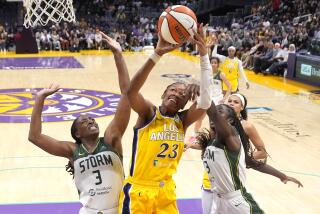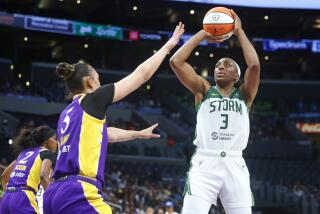Cooper Is Taking It in Stride
For those accustomed to seeing Michael Cooper prowling the sidelines like a starving panther, agonizing over any perceived bad call against his Spark team, these are strange times.
Cooper this season is so calm, you want to check his pulse. Once he sits down, he puts his chin in his left hand, then rarely moves until the game ends--win or lose.
Mention this to Cooper and there is a quick smile. He does not want people to think he cares any less about winning since the Sparks won the WNBA championship last year. But winning that title did change him.
He is less animated, more reflective. He learned that the game does not have to be micromanaged. That, sometimes, it’s OK to sit back and watch.
“Our team knows what to do, as far as winning [goes],” Cooper said. “We as a coaching staff try to get them as prepared as possible before a game, and then let them do it.
“Last year we were trying to figure out who could get it done, who we hoped could get it done. This year we know who can get it done. If I were to become less serene, it would be to some players who make bad fouls or unforced turnovers. But no, this year has been easier because they know how to win now.”
Assistant Glenn McDonald agrees that Cooper is more trusting of the players.
“As a coach, you want to show your players you are as involved as they are,” said McDonald, who has been Cooper’s top assistant since 2000. “Last year, when we knew we were supposed to win the championship, everybody was on edge. This year, he lets them take care of business. He’s still intense, but he wants them to know it’s a game, not the end of the world.”
Cynics could argue that Cooper, 70-10 since taking over the Sparks in 1999, can afford to be more relaxed because he has, arguably, the best team. How hard could it be to roll out the ball to Lisa Leslie, DeLisha Milton, Tamecka Dixon, Mwadi Mabika and Latasha Byears?
But those people apparently don’t remember Cooper as a player. A 1978 third-round pick of the Lakers from the University of New Mexico, the 6-foot-6 Cooper, who never weighed 200 pounds, was a defensive warrior with a capital W.
“Jack McKinney told me that was the best way for me to make the team,” Cooper said of the Laker coach at the time.
Pride drove him every night to try to frustrate the best NBA scorers, from Julius Erving and Alex English to Michael Jordan and Larry Bird.
“My goal was to keep them from scoring 20 points on me,” Cooper said.
The biggest change he brought to the Sparks was a defensive edge. As a player he wanted to be inside an opponent’s head and under his skin from jump ball to final horn. He wants that from his players now. A year ago, he prodded Leslie into her finest WNBA season. She was the most valuable player in the regular season, All-Star game and playoffs.
Cooper didn’t want to radically alter his approach this season, but he knew some things would have to change if the Sparks were to repeat.
He expected opponents to be more determined to keep Leslie from dominating offensively and he was right. Leslie is double- and triple-teamed in the post, which means she has to pass more. She is averaging 16.1 points, down from 19.5.
So other Sparks are emerging as offensive threats. Mabika and Milton have shown the ability to drive to the basket and are not reluctant to take big shots late in the game. Dixon can be off and on, depending on her aching feet, but remains one of the league’s better one-on-one players..
Cooper is also pleasantly surprised by another way his team has evolved.
“As far as communication, it’s more of a ‘look’ now,” he said. “It doesn’t have to be a stern look or humorous look. But we can look at each other without calling timeouts and understand what we’re doing.”
Last year, Cooper’s tirades earned him six technical fouls. The league assesses a fine between $100 and $125 for each technical. Cooper has only one technical foul this year.
“I don’t want the league getting in my pocket,” Cooper said with a chuckle.


